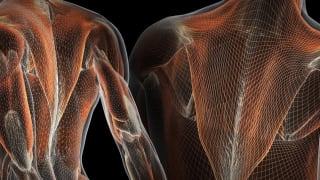Nika C. Beamon's body has been through a lot. Nearly two decades spent battling a rare autoimmune disorder damaged her liver, stomach, pancreas, and spine, leaving her in crippling pain and often walking with a cane. After a slew of treatments—including surgery and steroid injections—failed to provide lasting relief, Beaman, a TV writer in New York City, found herself turning to prescription opioids.
"I was really becoming dependent [on those drugs] to get through every day," says Beamon, who experienced debilitating withdrawal symptoms when weaning off one of those drugs, tramadol (Ultram, ConZip, and generic). "I felt the drugs being given to me to help were actually hurting."
Desperate for an alternative, Beamon turned to her pharmacist, who recommended cannabidiol—commonly known as CBD. That's a compound that can be extracted from the cannabis plant, which includes marijuana and hemp. Growing research suggests that CBD may help ease pain, seizures, and anxiety. Yet unlike cannabis's other well-known compound, THC (tetrahydrocannabinol), CBD does not get people high.
Beamon began using a CBD tincture, placing several drops under her tongue or mixed into drinks, several times a day. The results were "revolutionary," she says. "I sleep through the night, finally, without waking up in pain." What's more, she is no longer reliant on opioids. "That's a complete relief to me."
Beamon's experience illustrates one way patients and physicians are increasingly using CBD, not just to ease pain but also to see if the compound can reduce reliance on opioids. And researchers across the country are now studying whether CBD (alone or in combination with THC) could be a tool in the fight against the ongoing opioid crisis.
"CBD has promising effects on pain, which could make it an effective substitute for opioids," says Shereef Elnahal, M.D., the commissioner of New Jersey's Department of Health and a strong supporter of medical marijuana. He also points to studies in the Journal of the American Medical Association showing that in states where people could legally use marijuana, the number of filled opioid prescriptions dropped significantly, and there were lower rates of opioid overdose and death, compared with states without legal cannabis. Though several factors could contribute to those results, researchers find the link between cannabis laws and declining opioid use intriguing.
Enthusiasm for this research—along with anecdotal reports from patients—has prompted several states to allow some patients to substitute medical marijuana (CBD and/or THC) for opioids. In New York, patients enrolled in a certified treatment program for opioid use disorder, the technical term for opioid addiction, can now try marijuana as an alternative. "Adding opioid replacement as a qualifying condition for medical marijuana offers providers another treatment option, which is a critical step in combating the deadly opioid epidemic," New York State Health Commissioner Howard Zucker, M.D., said in a statement.
Still, scientists caution that the evidence is preliminary. "Early research suggests that some cannabinoids or combinations of cannabinoids may have the potential to help people wean off opioids, but more rigorous studies are needed," says Jeffrey Selzer, M.D., chair of the public policy committee for the American Society of Addiction Medicine and director of the Physician Resource Network at Northwell Health in Manhasset, N.Y.
What does the science show so far? Can CBD—with or without THC—help treat chronic pain and curb opioid dependence? We asked the experts.
CBD as a Pain Reliever
While considerable evidence shows that CBD and THC can help treat pain when given together, there's not as much for CBD alone, says Ziva Cooper, Ph.D., research director of the Cannabis Research Initiative at the University of California, Los Angeles. "Much of what we know on CBD's effects on pain comes from animal studies," she adds.
Still, researchers do know that CBD can fight inflammation, which may relieve pain. Other research has shown that cannabinoids interact with receptors throughout the body, including the brain—through pathways called the endocannabinoid system—which could also explain how the compounds affect pain (as well as other things, from mood to appetite).
And even without a robust body of scientific literature, some doctors and patients are trying CBD for pain management. Julia Arnsten, M.D., chief of general internal medicine at Montefiore Medical Center in New York City, has been using medical marijuana in her practice for about five years. She has found that both CBD and THC help some patients safely manage chronic pain. For patients who can't tolerate the psychoactive effects of THC, Arnsten sometimes suggests they use mainly CBD or take CBD during the day and THC at night.
But she emphasizes that the process is trial and error and that practitioners have not yet determined the best ways to use and dose cannabinoids for pain.
CBD as an Addiction Antidote
Research on CBD's potential to treat opioid addiction itself is even more preliminary, though growing. Yasmin Hurd, Ph.D., director of the Addiction Institute at Mount Sinai in New York City, for example, has shown that CBD reduces cravings for heroin, in both rats and humans.
And she point out that CBD has few side effects (most of which are minor), making it an attractive option to treat opioid addiction.
Philip Blair, M.D., a family physician in Vancouver, Wash., and a consultant for the CBD manufacturer Elixinol, says he has helped dozens of patients taper off opioids by substituting with CBD. He encourages them to go at their own pace, stretching out the time between opioid doses and slowly adding in CBD. "If they know they have something to rely on, to count on, to get back to normal and get them through this time period, they can do it," he says.
Arnsten, at Montefiore Medical Center, has also weaned patients off opioids by putting them on cannabis, both THC and CBD, but "it's slow going," she says. "We're probably going to need to see thousands of patients before we get enough to say, yeah, this is really successful."
How might CBD treat opioid addiction? "There's a big controversy," about that, says Hurd, at Mount Sinai. But one possibility is that it affects how brain cells that have been damaged by opioids communicate with each other, she says.
It could also decrease cravings and anxiety, common symptoms of opioid withdrawal. "Being able to decrease their stress and anxiety response will go very far in decreasing their drug use, so even if we don't know exactly why CBD is working, if it works on craving and anxiety, that actually is very positive," Hurd says.
Chinazo Cunningham, M.D., professor of medicine at Albert Einstein College of Medicine and Montefiore Health System in New York City, is studying patients with chronic pain who take opioids. She's seeing if adding medical marijuana controls pain and reduces reliance on opioids. "On top of that, we're looking at THC and CBD to try and tease out how each of them individually or together are associated with opioid use and pain relief," Cunningham says.
Quality and Safety Questions
Scientists looking into CBD's potential to treat pain and addiction caution that some of the products on the market have questionable quality. "CBD purchased online and in most states isn't subject to rigorous testing requirements, so what you see on the label doesn't always reflect what's in the bottle," says Cooper, at UCLA.
Some researchers also warn that though CBD and cannabis pose fewer risks than opioids, that doesn't mean they are harmless. For example, CBD can interact with some prescription drugs. And THC can cause several side effects, including anxiety and panic attacks; it can also lead to dependence in long-term users.
Finally, experts CR spoke with say that it can be dangerous to use CBD in place of potentially more effective treatments—including those used for addiction. Cunningham, for example, points out that several FDA-approved treatments for addiction are already available. "We know that methadone works, and we know that buprenorphine works," she says. "We have no idea if marijuana works," she says.
Coming Up With a Treatment Plan
- Talk with your doctor. While you can purchase CBD at a retail store, a pharmacy, or online, if you want to purchase CBD through a state-licensed dispensary, you'll need a recommendation from a doctor. (Physicians technically still can't "prescribe" CBD or other cannabis products, but most states allow physicians to "recommend" CBD.) Regardless of how you obtain the CBD, experts recommend that you take it while under medical supervision, particularly if you're dealing with a serious issue such as chronic pain or opioid use disorder. If your primary healthcare provider is not familiar with CBD, ask if she can refer you to one who who is. (Read more about how to use CBD safely.)
- Go slowly. If you and your doctor decide to try substituting CBD for a prescription pain reliever, start with a low dose, increase it gradually, and follow up with your physician. That will make it easier to address withdrawal symptoms, prevent potential interactions with medications, and ensure that your overall health condition is well-managed.
- Choose products carefully. Because cannabis is largely unregulated, it can be difficult to know which CBD products have been formulated responsibly, are free from contaminants, and contain the ingredients that the product labels list. For instance, a 2017 JAMA study that evaluated CBD products bought online found that 26 percent of them contained less CBD than what was listed on the label.
So look for companies that have commissioned third-party testing and can provide a Certificate of Analysis, or COA. That should show how much CBD and THC the product contains, as well as how the product did in tests checking for contaminants. If you can't find a COA on the company's website or the company refuses to share it, that's a red flag. (Read more about how to shop for CBD.)





















